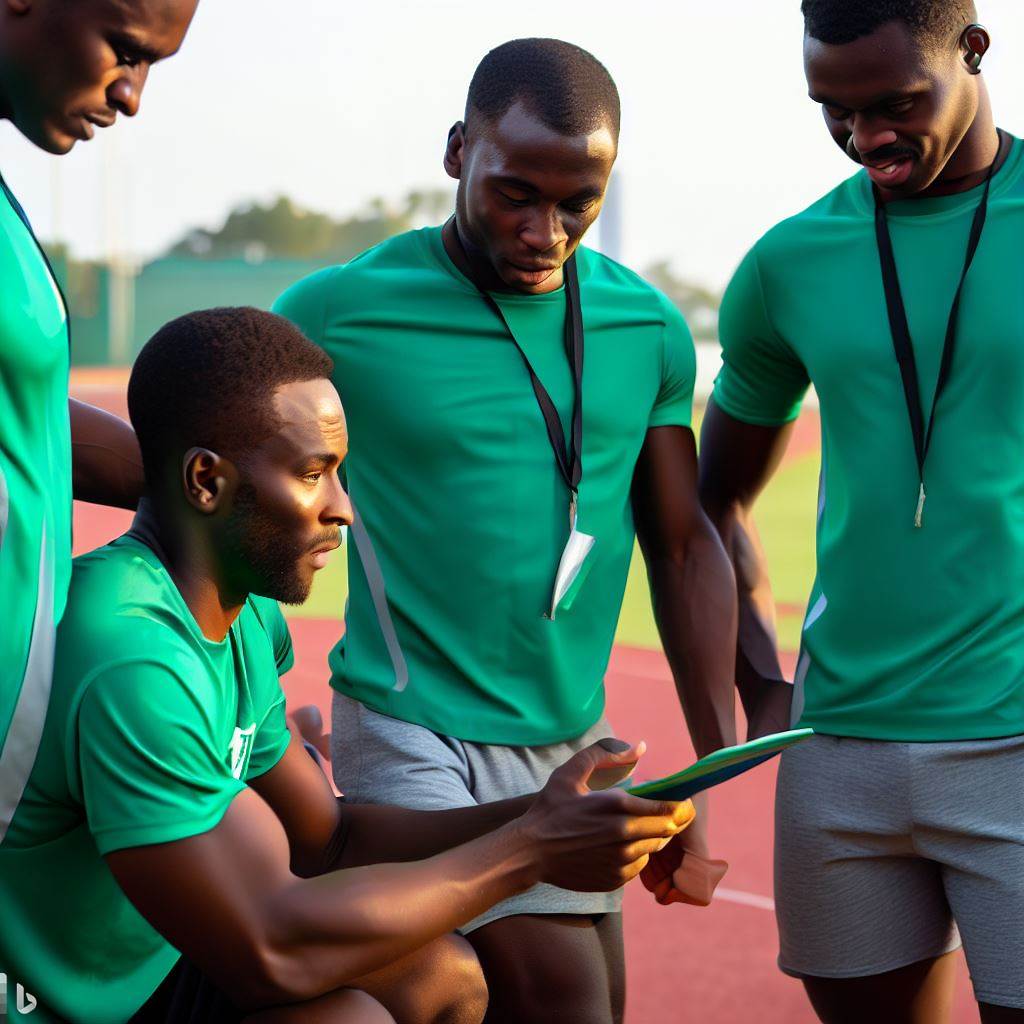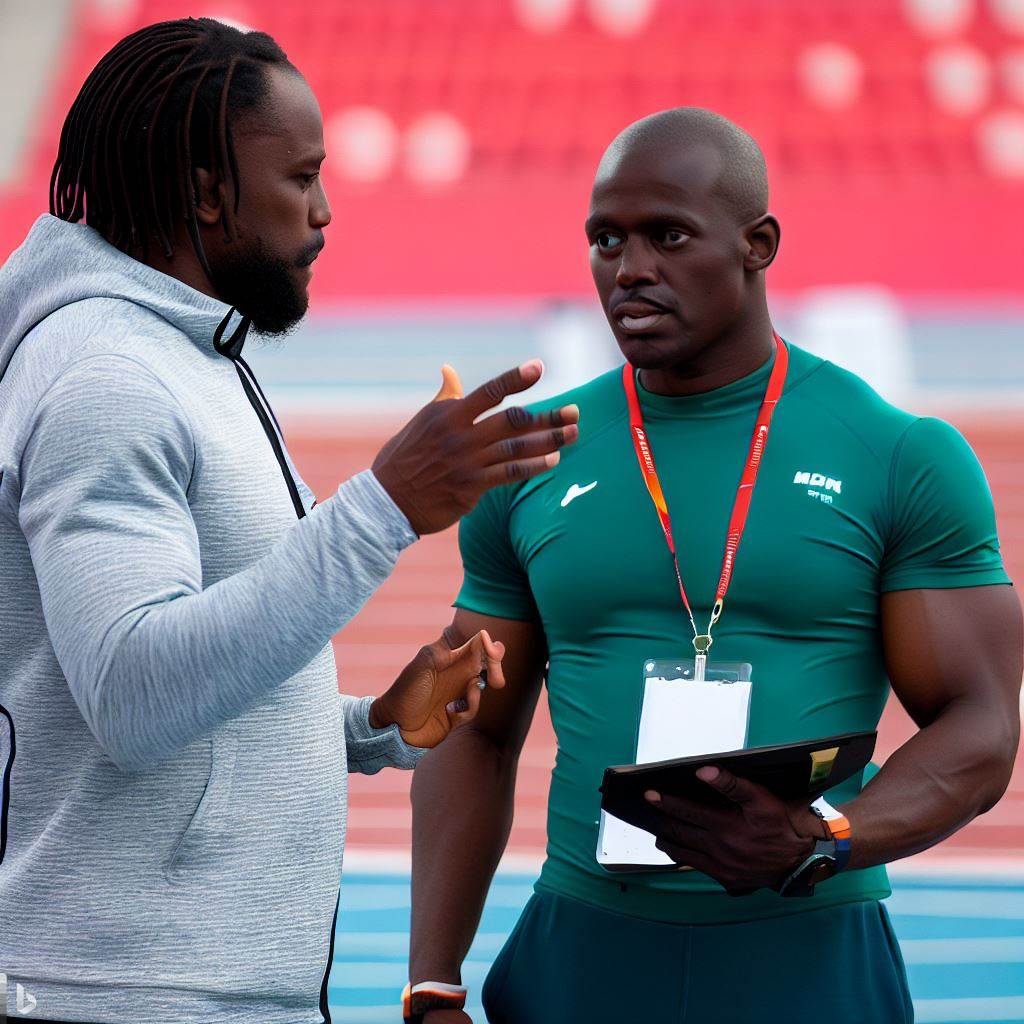Introduction
Explore the critical nexus of Athletic Training Ethics and Best Practices in Nigeria, shedding light on the essential principles guiding sports education.
Brief explanation of athletic training
Athletic training involves the prevention, diagnosis, and treatment of injuries in athletes.
It plays a vital role in enhancing athletic performance and overall well-being.
Ethics and best practices are crucial in athletic training to ensure the highest standards of care and professionalism.
Ethical considerations guide athletic trainers in making decisions that prioritize the athlete’s health and well-being.
Best practices refer to the implementation of evidence-based techniques and strategies to optimize athletic training outcomes.
Overview of the importance of ethics and best practices in athletic training
In Nigeria, athletic training is gaining recognition as more athletes compete on national and international stages.
With this growing prominence, a focus on ethics and best practices becomes imperative to protect the athletes and foster a positive athletic culture.
Ethics in athletic training entail respecting athletes’ autonomy, maintaining confidentiality, and avoiding conflicts of interest.
Adhering to these principles builds trust between athletes and trainers, creating a supportive environment for their physical and mental well-being.
Best practices in athletic training involve utilizing the latest research and evidence-based techniques to provide optimal care.
This includes proper injury prevention, efficient diagnosis, effective treatment plans, and appropriate rehabilitation strategies.
Introduce the focus on athletic training in Nigeria
In Nigeria, the field of athletic training is evolving. There is a need to establish guidelines and standards specific to the Nigerian context, considering cultural, social, and economic factors.
This ensures that athletic trainers in Nigeria are well-equipped to handle the unique challenges faced by Nigerian athletes.
In the following sections, we will delve into specific ethical considerations, best practices, and challenges in the field of athletic training in Nigeria.
By exploring these aspects, we hope to promote high standards of care and contribute to the growth of athletic training in Nigeria.
Historical Context of Athletic Training in Nigeria
Overview of the development of athletic training
In Nigeria, the development of athletic training has a rich history that dates back several decades.
Initially, it was not recognized as a specialized profession, but rather a combination of various disciplines.
Athletics and sports were viewed as recreational activities, and there was a lack of understanding regarding the importance of proper training and injury prevention.
Over time, as sports gained popularity and Nigeria began to compete on the international stage, the need for professional athletic trainers became more evident.
As a result, various stakeholders, including government bodies, sports associations, and educational institutions, started recognizing the significance of athletic training.
Challenges faced in the past regarding ethics and best practices
In the past, Nigeria encountered numerous challenges concerning ethics and best practices in athletic training.
One major obstacle was the absence of standardized guidelines and codes of conduct.
Without clear ethical standards, trainers often improvised their techniques, leading to inconsistent practices and potential harm to athletes.
Another challenge was the lack of awareness among athletes, coaches, and administrators regarding the importance of ethical behavior in sports.
Unethical practices such as performance-enhancing drug use and cheating were prevalent due to the absence of stringent policies and educational programs.
Introduction of key stakeholders and organizations involved
To address these challenges, several key stakeholders and organizations have emerged in Nigeria’s athletic training landscape.
The National Sports Commission (NSC) plays a crucial role in overseeing the development and implementation of ethical practices in sports.
They work closely with the Athletic Trainers’ Association of Nigeria (ATAN), a professional organization dedicated to promoting best practices and ethical conduct among athletic trainers.
Additionally, various educational institutions have introduced degree programs in sports science and athletic training.
These programs aim to equip aspiring trainers with the necessary knowledge and skills to ensure ethical practices and optimal performance in athletes.
As the field of athletic training in Nigeria continues to evolve, it is crucial to acknowledge the historical context and address the challenges faced in the past.
The development of standardized guidelines and ethical codes, along with increased awareness and education, is vital in fostering best practices and upholding ethical standards in athletic training.
Through the collaborative efforts of stakeholders and organizations, Nigeria’s athletic training industry has the potential to reach new heights, benefiting both athletes and the sporting community as a whole.
Read: The Impact of Nigerian Athletes in International Sports
Current State of Athletic Training in Nigeria
A discussion on the existing athletic training programs and facilities
An examination of the ethical issues and best practices being followed
An exploration of the challenges faced by athletic trainers in Nigeria
In this section, we will take a closer look at the current state of athletic training in Nigeria.
This includes a discussion on the existing athletic training programs and facilities, an examination of the ethical issues and best practices being followed, and an exploration of the challenges faced by athletic trainers in the country.
Discussion on the Existing Athletic Training Programs and Facilities
Nigeria has made significant progress in developing athletic training programs and facilities.
Several universities and sports institutes offer courses and certifications in athletic training.
These programs aim to equip aspiring athletic trainers with the necessary knowledge and skills to provide effective care to athletes.
However, there is a need for further improvement, particularly in terms of curriculum updates and practical training opportunities.
A lack of adequate funding can hinder the development and maintenance of modern athletic training facilities.
This poses a challenge to both trainers and athletes who rely on these facilities for injury prevention, treatment, and rehabilitation.
Examination of the Ethical Issues and Best Practices Being Followed
Ensuring ethical standards and best practices in athletic training is crucial for the well-being and safety of athletes.
In Nigeria, there are efforts to establish and enforce codes of conduct for athletic trainers.
However, challenges persist, such as the lack of awareness and enforcement of these ethical standards.
This raises concerns about the quality of care provided to athletes and the potential for unethical practices.
Best practices in athletic training include continuous education and professional development, proper communication with athletes and coaches, confidentiality, and respect for athletes’ rights and welfare.
It is important for athletic trainers in Nigeria to adhere to these best practices and actively seek opportunities for further education to enhance their knowledge and skills for the benefit of the athletes they care for.
Exploration of the Challenges Faced by Athletic Trainers in Nigeria
Athletic trainers in Nigeria face various challenges in their professional practice.
One of the main challenges is the limited recognition and value placed on their role in sports medicine.
There is a lack of understanding about the importance of athletic trainers in injury prevention, immediate management, and rehabilitation.
This leads to a diminished role for athletic trainers and a reliance on other healthcare professionals who may not have specialized training in sports medicine.
Another challenge is the limited resources and equipment available to athletic trainers.
This includes access to proper diagnostic tools, treatment modalities, and rehabilitation facilities.
Furthermore, athletic trainers often face challenges in accessing athletes, particularly in remote areas or marginalized communities where sports programs may be scarce or underfunded.
Overall, while Nigeria has made progress in developing athletic training programs and facilities, there are still challenges to overcome.
Ensuring ethical standards, promoting best practices, and addressing the challenges faced by athletic trainers are crucial for the advancement of athletic training in Nigeria.

Ethical Guidelines for Athletic Training in Nigeria
Overview of international ethical standards in athletic training
- International ethical standards in athletic training provide a framework for ethical practice.
- These standards emphasize the importance of patient care, confidentiality, and professional competence.
- Athletic trainers are expected to adhere to these standards to ensure the well-being of athletes.
Examination of how these standards apply to the Nigerian context
- Nigerian athletic trainers must understand and implement the international ethical standards.
- Adapting these standards to the Nigerian context is essential to address cultural and societal differences.
- Respect for local traditions and customs should be considered when applying international ethical guidelines in Nigeria.
Introduction of local ethical guidelines specific to Nigeria
- To supplement international standards, Nigeria should develop its own ethical guidelines for athletic training.
- These guidelines should take into account the unique challenges and circumstances faced by Nigerian athletic trainers.
- Collaboration with local stakeholders, such as sports organizations and healthcare professionals, is crucial in formulating these guidelines.
- Nigerian ethical guidelines should include provisions for athlete safety, privacy, and informed consent.
- Emphasizing the importance of continuing education and professional development can improve ethical practice in Nigeria.
- The guidelines should also address issues related to doping, discrimination, and fair play in athletic training.
- Implementation and enforcement of the local ethical guidelines require the support and cooperation of all stakeholders.
- Regular updates and revisions of these guidelines are necessary to keep up with evolving ethical standards and practices.
- Nigerian athletic trainers should be provided with resources and training to ensure their understanding and compliance with the ethical guidelines.
- Ethical guidelines in athletic training are essential for maintaining the integrity and professionalism of the field in Nigeria.
- By adhering to these standards, Nigerian athletic trainers can establish trust with athletes, coaches, and the larger sporting community.
- Ethical practice not only benefits individual athletes but also contributes to the overall development and success of Nigerian sports.
In review, ethical guidelines for athletic training in Nigeria should encompass both international standards and local considerations.
Adapting these guidelines to the Nigerian context ensures cultural sensitivity and addresses unique challenges. Collaboration, education, and enforcement are crucial for effective implementation.
By following these ethical guidelines, Nigerian athletic trainers can contribute to the growth and success of the sports industry while prioritizing athlete well-being and integrity.
Read: Training Programs for Assistant Coaches in Nigeria
Best Practices in Athletic Training in Nigeria
Discussion on the importance of evidence-based practices
- Implementing evidence-based practices is crucial for improving the quality of athletic training in Nigeria.
- It ensures that athletes receive the most effective and scientifically-backed treatments and interventions.
- By relying on evidence, athletic trainers can make informed decisions and provide better care.
- This approach also helps to standardize practices and reduce the risk of unethical or harmful treatments.
Examination of the role of continuing education for athletic trainers
- Continuing education is essential for athletic trainers to stay updated with the latest research and best practices.
- It allows them to expand their knowledge and skills to meet the evolving needs of athletes.
- Through ongoing learning, athletic trainers can provide better care and improve the overall quality of athletic training.
- Continuing education also plays a crucial role in maintaining professional certifications and licenses.
Introduction of successful athletic training programs and practices in Nigeria
- Nigeria has made significant progress in establishing successful athletic training programs and practices.
- The Nigerian Athletic Trainers’ Association (NATA) has been instrumental in promoting excellence in the field.
- Several universities and sports organizations have developed accredited athletic training programs.
- These programs provide aspiring athletic trainers with the necessary knowledge and skills for effective practice.
- In addition, successful practices such as injury prevention, rehabilitation, and athlete education are being implemented.
Evidence-based practices, continuing education, and successful programs have elevated athletic training in Nigeria.
With a focus on quality and ethics, Nigerian athletic trainers are better equipped to provide optimal care and support to athletes.
By embracing best practices, they can contribute to the overall development of sports in the country and enhance the well-being of athletes at all levels.
Read: Salary Insights: Assistant Athletic Trainers in Nigeria
Importance of Ethical and Best Practices in Athletic Training
Exploration of the benefits for athletes, trainers, and the sport community
- Ethical and best practices in athletic training ensure the well-being and safety of athletes.
- By adhering to ethical guidelines, trainers can build trust and establish a positive relationship with athletes.
- Employing best practices leads to improved athletic performance and reduces the risk of injuries.
- Ethical training practices promote fairness, integrity, and sportsmanship within the sport community.
- Athletes who receive ethical and competent training are more likely to reach their full potential.
Discussion on the consequences of unethical and substandard practices
- Unethical practices in athletic training can lead to physical, psychological, and emotional harm to athletes.
- Trainers who engage in substandard practices compromise the athlete’s development and performance.
- Unethical behavior erodes trust and undermines the reputation of the sport community.
- Athletes subjected to unethical practices may develop a negative perception of the sport and lose motivation.
- In extreme cases, unethical practices can result in legal consequences and penalties for trainers and organizations.
Analysis of the potential impact on Nigeria’s athletic success at the global level
- Adherence to ethical and best practices in athletic training is crucial for Nigeria’s success in international competitions.
- A reputation for ethical training practices enhances Nigeria’s standing in the global sport community.
- Athletes trained ethically are more likely to attract international recognition and sponsorship opportunities.
- Implementation of best practices improves the overall quality of Nigerian athletes’ preparation and performance.
- Failing to prioritize ethical standards may hinder Nigeria’s ability to compete and succeed at the global level.
In short, ethical and best practices in athletic training play a vital role in the success and well-being of athletes, trainers, and the sport community.
Upholding ethical guidelines ensures the safety and development of athletes, fostering trust and positive relationships.
Conversely, engaging in unethical or substandard practices can have severe consequences, including harm to athletes, damage to reputation, and legal repercussions.
For Nigeria, prioritizing ethical and best practices is essential for achieving success in international competitions, attracting recognition, and improving overall athletic performance.
Read: Promoting Sportsmanship: Lessons from Nigerian Athletes
Recommendations for Improving Athletic Training in Nigeria
To further enhance the athletic training programs in Nigeria, several strategies can be implemented:
Proposal for strengthening the existing athletic training programs
- Revise and update the curriculum to align with international standards and best practices.
- Increase funding for athletic training programs to provide better resources and facilities.
- Implement a system for ongoing professional development and continuing education for athletic trainers.
- Establish partnerships with professional sports teams to offer internships and practical training opportunities.
- Enhance the recruitment process for athletic trainers by collaborating with universities and sports organizations.
Suggestions for building partnerships and collaborations with international organizations
- Establish relationships with international athletic training organizations for knowledge exchange and mentorship.
- Create joint research projects with international partners to improve the understanding of athletic training practices.
- Organize workshops and conferences with international experts to promote knowledge sharing and networking.
- Create exchange programs to allow Nigerian athletic trainers to gain experience and exposure abroad.
- Seek sponsorship from international corporations to support athletic training initiatives in Nigeria.
Introduction of strategies to enhance ethical awareness and implementation of best practices:
- Develop a code of ethics specifically tailored to the Nigerian context and athletic training profession.
- Offer training sessions on ethical principles and their application in athletic training.
- Establish a reporting mechanism for ethical violations, ensuring confidentiality and protection for whistle-blowers.
- Implement regular audits and evaluations to monitor adherence to ethical guidelines and best practices.
- Collaborate with sports governing bodies to enforce strict consequences for ethical misconduct.
By implementing these recommendations, the field of athletic training in Nigeria can experience significant improvements.
Conclusion
Recap of the importance of ethics and best practices in athletic training
Ethics and best practices play a crucial role in athletic training, ensuring the safety and well-being of athletes.
Summary of the current state of athletic training in Nigeria
Currently, the state of athletic training in Nigeria is facing challenges, including a lack of resources and professional standards.
Closing thoughts on the potential for growth and improvement in the field
However, there is great potential for growth and improvement in the field, with advancements in training methods and increased awareness of ethics.
On a final note, it is imperative to prioritize ethics and best practices in athletic training to create a safe and effective environment for athletes.
Despite the current challenges in Nigeria, there is hope for the future with the potential for growth and improvement in the field.
By addressing the gaps in resources and establishing professional standards, athletic training in Nigeria can evolve and flourish.
The commitment to ethics and best practices will not only benefit athletes but also contribute to the overall development of sports in the country.




